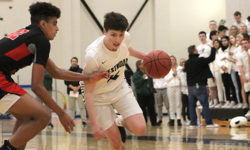[ccfic caption-text format="plaintext"]
By Stephen Press
Hometown Weekly Staff
Summers in the suburbs have always had their own specific vibe, an amalgamation of outdoor adventure, old friends and conspicuous leisure time that can make even the most cynical of individuals nostalgic and wistful. For younger members of suburban communities, it is the finest of seasons, far removed from the schoolwork and structure that defines the rest of the year.
This summer, though, there's a wrinkle that's thrown a wrench in the gears of - or, depending upon who you ask, fit seamlessly into - the beloved summer fabric.
Hometown Weekly's communities, like most communities across the country (and the world, for that matter) are in the throes of a Pokémon GO craze. GO, a video game for smartphones running either iOS or Android platforms, erupted onto the scene soon after its July 6 release date, turning legions of serious gamers, longtime Pokémon fans, and casual smartphone users alike into devotees.
You've surely seen people playing the game, whether or not you've recognized it as such. You've probably also been acquainted with Pokémon, too, a thriving brand that has inserted itself into American popular culture over the last couple of decades. There is nothing new or novel about Pokémon itself or its characters - they have been with us since 1996.
So, why now? Why the sudden spike in popularity? What makes a video game - generally the antithesis of summer's outdoorsy, communal vibe - explode in popularity during the heart of a sweltering July?
Dr. Bug's empire
Satoshi Tajiri, the man who created Pokémon, grew up straddling two worlds. These days, Machida, the Tokyo suburb in which Tajiri spent his childhood, looks every bit a part of the bustling metropolis abutting it. It's densely developed and urban - there is no mistaking it for the countryside. In 1970, though, Machida was still a community on the rise, a rural hamlet gradually integrating into Tokyo's urban sprawl. It was the perfect playground for a kid with an imagination.
"There were rice paddies, rivers, forests," Tajiri told Time Asia in 1999. "It was full of nature. Then development started taking place, and as it grew, all the insects were driven away. I was really interested in collecting insects." And collect he did, obsessively searching the wild areas around his home for new additions.
So interested was Tajiri in the creepy-crawlies that surrounded his home that he earned a nickname among his friends: Dr. Bug. He dreamed of becoming an entomologist.
"Every time I found a new insect, it was mysterious to me. And the more I searched for insects, the more I found," he said. "If I put my hand in the river, I would get a crayfish. If there was a stick over a hole, it would create an air bubble and I'd find insects there. I usually took them home. As I gathered more and more, I'd learn about them," he went on, describing his perpetual bug-hunting.
Progress, however, put an end to his rural idyll.
"Every year they would cut down trees and the population of insects would decrease," reflected Tajiri. "The change was so dramatic. A fishing pond would become an arcade center."
Even Dr. Bug himself was not immune to the changes. As he got older, he became fascinated with video games, eventually editing Game Freak, an arcade-focused and self-produced publication, by the time he was 17. His fascination continued to grow, eventually leading him to become a game designer by the end of the 80s.
Still, despite the changing landscape, Tajiri's love of bug-collecting remained within him.
"Places to catch insects are rare because of urbanization. Kids play inside their homes now, and a lot had forgotten about catching insects. So had I," he admits. "When I was making games, something clicked and I decided to make a game with that concept. Everything I did as a kid is kind of rolled into one--that's what Pokémon is."
Collecting, the impetus behind Dr. Bug's fascination with insects, became the cornerstone of the Pokémon franchise, and perhaps the biggest reason for its popularity. At its heart, the series revolves around aggregating individual creatures - called Pokémon - for one's own collection.
It's an idea that has been a tremendous success, having been translated into multiple different forms. There are, of course, the video games. There are also trading cards. There is the animated television series, a number of feature films, and merchandising to an extent rivaled only perhaps by Mario, Nintendo's signature character. Pikachu, Pokémon's own signature creature, may in fact be more recognizable worldwide than Nintendo's mustache-wearing standard-bearer.
For many Millennials, Pokémon has taken the place that was once occupied by stamps, coins or baseball cards for members of other generations.
What makes Pokémon GO so unique is that it enmeshes the real world with the game world. Using smartphones' GPS capability - the very same capability that allows your phones to guide you from one destination to the next in your car - the game directs its players into the world around them to find the next Pokémon for their collections. One can only collect these creatures by physically bringing their phone to a real-world location.
For Tajiri, whose creation of Pokémon was a direct result of those bug-collecting adventures in Machida, GO must seem an entirely appropriate manifestation of his original vision. Not only are consumers engaging with his creations, but in a similar manner to the way he used to scour the Japanese countryside for his own six-legged prizes.
GOing somewhere?
There is a stereotype, for better or worse, of an American Pokémon enthusiast. He or she is introverted. Pale, perhaps, from lack of exposure to sunlight. Unwilling to leave the house. Perhaps a bit anti-social. Bluntly speaking, a little bit of a nerd.
This stereotype is perhaps best illustrated when Hometown Weekly Editorial Intern (and Medfield resident) Cameron Small reminisces on his Pokémon salad days.
"In fourth and fifth grade, it was huge with my class. I remember with my friends, we'd pretend we were Pokémon and battle like that. It was so nerdy, but it was the thing back then," he smiles.
"We didn't end up playing together," he adds when he mentions playing the video games at friends' houses. "They had extra Game Boys [the hand-held gaming devices on which Pokémon first appeared] and we would sit in a room, each on a different Game Boy, playing a different Pokémon game." Slightly ridiculous, he admits, in retrospect.
The Pokémon GO player, however, cannot be so easily pigeonholed, as the game requires active interaction with the real world.
Amelia Tarallo, for example, a Medfield resident who counts herself among the multitude of enthusiastic Pokémon GO players, has never identified with either the video gaming or Pokémon worlds. Still, even she has found herself leaving the house specifically to play the game.
"I've gotten bored enough that I've gone out," she admits. Beyond that, though, the game seems to have imbued her normal everyday tasks with a little added fun.
"It's fun because you have to go out and walk, and you can say: 'Oh I have to go out and do this stupid thing,' but 'well, I get to catch this awesome Pokémon,' so it's great."
She's also noticed the game's effects of her brother, an avid video gamer who is typically loath to leave the house. "He's gone out every night this week," she says. "It's really weird. I'm not sure what to think about it."
Mystery or not, it seems most would classify that as a major point in the game's favor.
GO fly a kite
There are, of course, as many Pokémon GO detractors as there are enthusiasts. For some, it comes down to mere annoyance.
Medfield's Evan Mayer, for example, grows tired of the hype surrounding the game. "I'm going through my news feed [on Facebook]," he says, "and it's 'Pikachu this,' or 'Charizard this,' so it's kind of annoying now … Pokémon GO just has to chill out online, on social media." Still, he adds, "I think it's good if it's getting kids out there to be outside. Go for it - I'll suck it up."
Others - especially those who never had a relationship with the franchise to begin with - see it as a frivolous (if nostalgic) waste of time, if not worse.
"I just missed the boat on that one. It never really appealed to me," says Walpole resident Jess McNamara, whose peers were huge fans of the franchise growing up. "It's like a language. Everyone knows what they're talking about and how to play - what's good, what's bad - but I don't know anything about it."
"Everyone I know is playing Pokémon GO all the time. It's just like Candy Crush [another popular smartphone game] was, or anything before that. But this one has a sentimental value."
McNamara, for her part, has already grown tired of it. "I'll be hanging out with my friends and they'll make me pull over the car so they can go and catch Pokémon. It's horrible."
"I will be driving through Walpole in the middle of the night and my friends will make me stop," she relates. "Or we'll be in a building and they'll just run off because there's something like a Pikachu nearby. It's such a hassle, because I couldn't care less."
That interaction with the real world? In her mind, it does more harm than good. "I've heard way more cases of people being in harm's way, of people playing and driving," she says. "I see people at all hours of the night walking around trying to find Pokémon."
Understandably, the law enforcement community seems a bit wary of it as well.
“I am particularly disheartened by the reports of blatant disrespect by players with no manners at Arlington National Cemetery, and even the Officer Sean Collier Memorial at MIT,” says Dover Chief of Police Peter McGowan.
“It has very quickly become an issue for many,” he continues. “Here in Dover, we have had interruptions as people enter the Town House in search of [Pokémon], and I have seen many people, both walking and riding bicycles, completely locked in on their phone screens and oblivious to other pedestrians - or worse, motorists.”
“I truly think it is only a matter of time before someone gets hurt, and I encourage parents to speak frankly with their kids about the dangers of distracted walking, biking or driving.”
It’s a theme echoed by all of the area’s police. “Don’t Pokémon GO on the go,” implores Chief John Carmichael of Walpole. “Both when driving and for pedestrians, use caution and pay attention to the sidewalks. And consider a helmet.”
“As always,” adds Detective Paul Toland of the Westwood Police Department, “law enforcement officials believe the less distractions, the better when maneuvering in a vehicle and/or on foot.”
Lt. Marie Cleary of the Wellesley PD echoes the same sentiment. “You should never play the game while driving a car, since distracted driving is one of the leading causes of crashes,” she reminds residents. “Players should also use caution when playing the game near streets and parking lots. Make sure you are aware of both your surroundings and real-life obstacles such as traffic lights and vehicles.”
Still, others seem to be taking an anticipatory, wait-and-see approach - not at all surprising, given the game’s relative youth. “We have not had any issues reported to us regarding people playing Pokémon GO,” admits Medfield Police Chief Bob Meaney. That doesn’t mean he couldn’t foresee it becoming a problem.
“As with anything else, common sense needs to prevail,” says Chief Meaney. “If your destination ends up being a weed-filled parking lot associated with an abandoned building, it may not be the best place to be.” He also adds that darkness could be a factor that increases the hazards associated with game play.
“The day/night safety issue is not just an issue of being in an area recognized for crime. There are also safety hazards: open holes, sharp objects, trenches. Some places are accessible during the day but not at night, such as the Medfield State Hospital grounds. As with geocaching [another scavenger hunting activity that relies on GPS], you need to look at where your feet are going and not just at the screen.”
It appears that we’ve entered uncharted territory with the emergence of Pokémon GO, the first game of its kind to go truly mainstream, and caution seems the best policy. “Parents need to make certain that their children are safe, supervised and always thinking of their surroundings, which is solid advice for any situation,” concludes Chief Meaney.
The only certainty, it seems, as our neighbors and friends follow their smartphones to the next of Satoshi Tajiri's virtual creations, is that Pokémon GO has arrived, and it has arrived in a big way.
Whether a fad or something more permanent, it is an undeniable part of this year's summer fabric.
Cameron Small, Hometown Weekly's Editorial Intern, contributed to the research of this article.
























